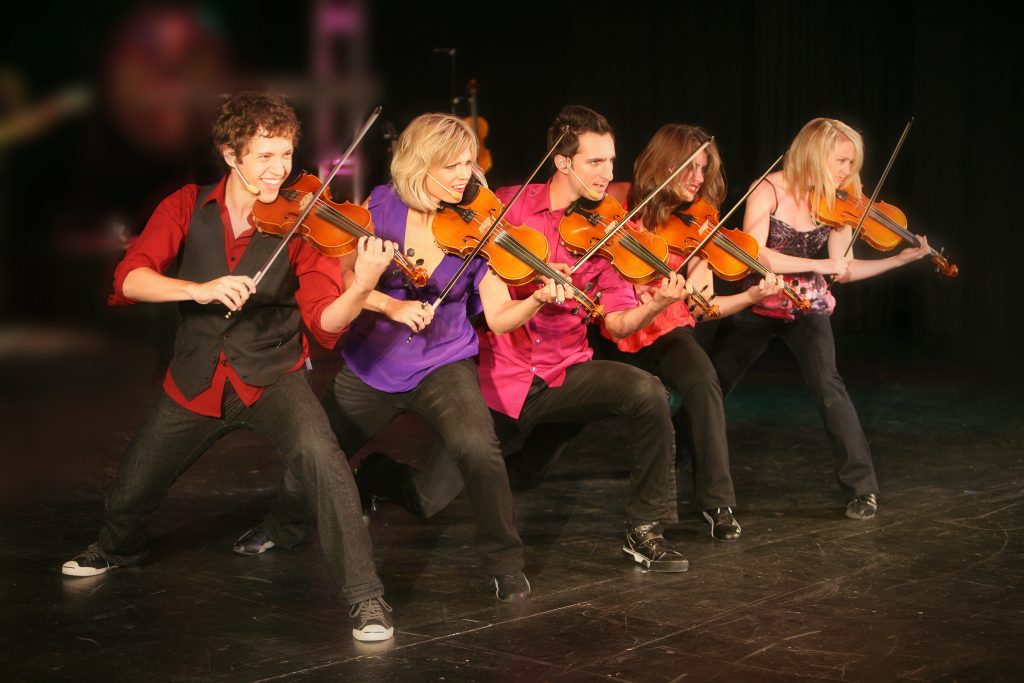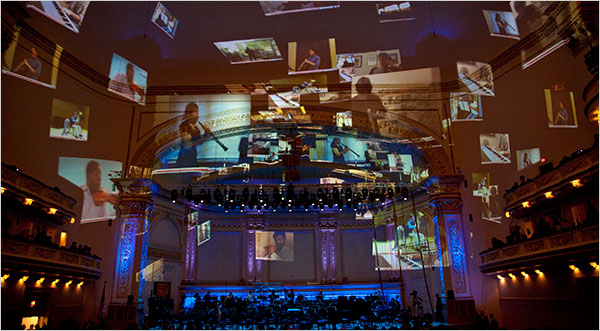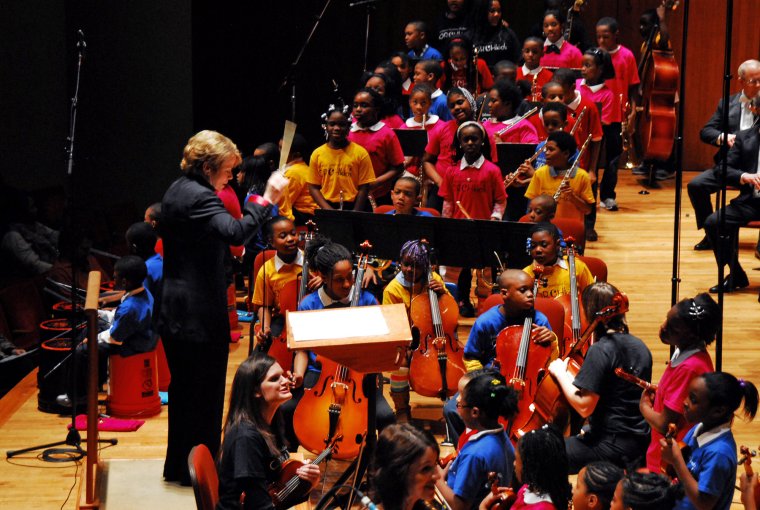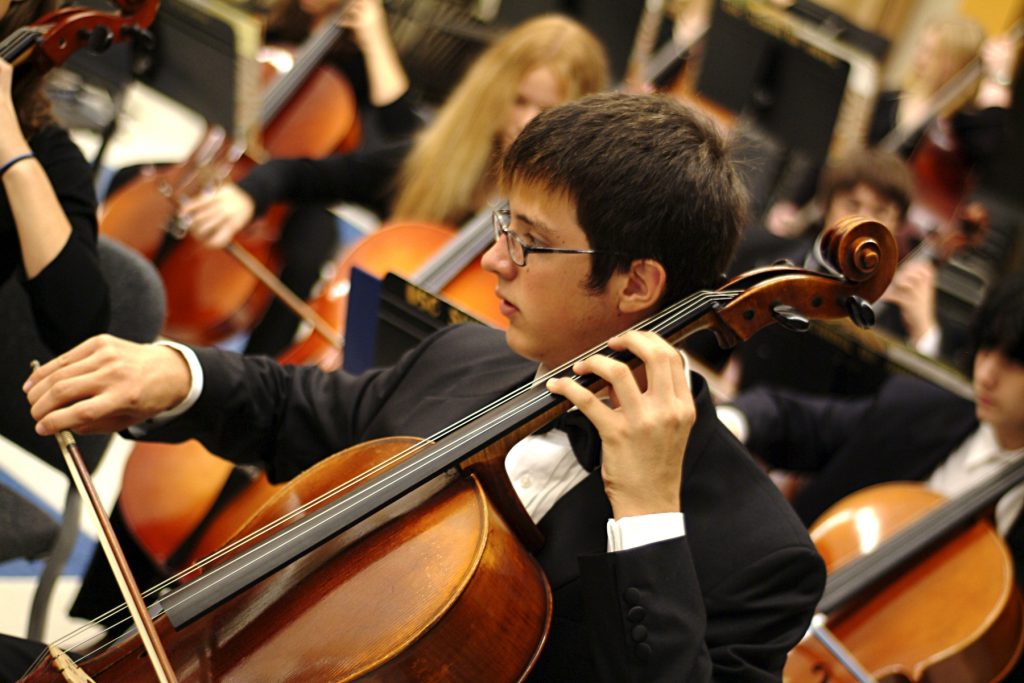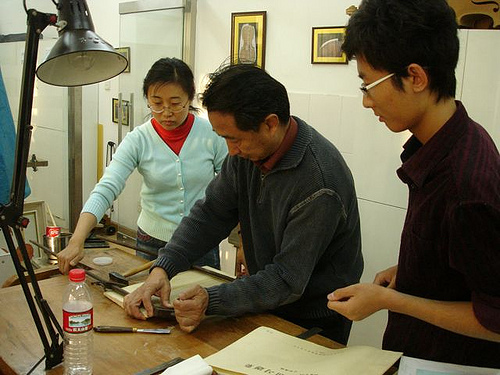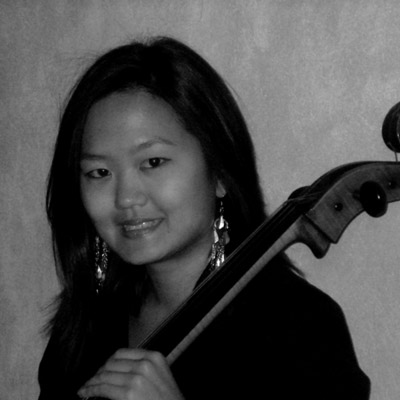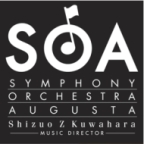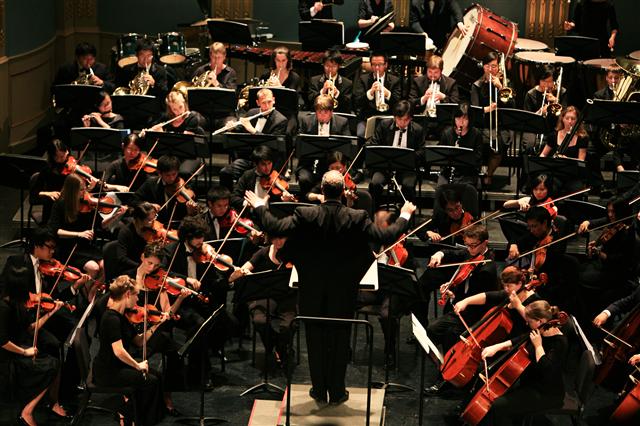My Ideal Orchestra – Barrage
August 29, 2011In this Article, violinist Jason Hurwitz opens with the phrase – “I get paid to live my dream.”That dream is his position as a performer with Barrage, what he calls an “in-your-face alternative violin show.”Jason talks about his training as a classical violinist, and how he yearned to explore other types of music with his violin in hand. He describes his path prior to joining Barrage, and what it took to join the ranks of such a renowned and fast-paced group. Jason’s story is an excellent reminder that there are endless paths and possibilities for musicians – you just have to keep your dream in mind and work hard to make it happen.
Orchestras at a Crossroads
June 25, 2011Remarks by Jesse Rosen, President and CEO, League of American Orchestras, at the “Red Alert” plenary session at the 66th National Conference, Minneapolis, June 8, 2011.
Baltimore Symphony Performs "OrchKids Nation"
May 30, 2011On Thursday, March 31 and Sunday, April 3, 2011 the Baltimore Symphony Orchestra presented a subscription concert at Meyerhoff Hall featuring a new work for their OrchKids students, an intensive in- and after-school program at two elementary schools in the troubled West Baltimore neighborhood. The kids, all 120 of them, wore their OrchKids T-shirts and played instruments, banged on buckets in the Bucket Band, or sang in the choir. But most importantly, they played with the BSO musicians in a piece written especially for them by NJ-based composer David Rimelis. I’m sure for many of the young performers, it was the experience of their young lives.
The Cleveland Orchestra – Around Towns
May 20, 2011Violist Felix Ungar is working on his doctorate at Eastman, but did his undergraduate and graduate study at the Cleveland Institute of Music. In this article he explores The Cleveland Orchestra’s response to economic hard times at home: touring, residencies, and new concert programs in Cleveland, such as the Center for Future Audiences and Fridays@7.
Compose for Youth Orchestras!
May 3, 2011In this article, composer Dan Visconti presents a compelling case for writing for youth orchestras. Particularly relevant to younger composers, Dan’s article contains many insightful points that force music creators to seriously consider the many opportunities that youth orchestras may offer. In an age of innovation and self-promotion, it seems crucial for younger writers to use creative thinking to identify opportunities which may be outside of the popular and well-worn path. Dan’s article is simply a must read for young composers. Thanks to NewMusicBox.org for letting us share this with you.
Would You Buy a “Made in China” Violin?
April 18, 2011When Laura Brownell needed to find a violin quickly, she visited the Remenyi House of Music in Toronto and became enamored of a beautiful violin that, surprisingly, turned out to be made in China.
Laura presents an interesting discussion of the quality of current Chinese-made violins, and the threat Chinese makers pose to traditional European violin workshops. She interviewed Michael Remenyi, the owner of the Remenyi House of Music, to find out his concerns about these instruments and the factors that cause him to offer them in his shop.
Finally, Laura discusses the role that Chinese-made string instruments will play in the lives of professionals musicians.
My Musical Journey
April 5, 2011In the following Article, cellist Susie Yang discusses her career path as a soloist, chamber musician, and orchestra musician. Having attended both the Julliard School and New England Conservatory, and having served as a fellow with the New World Symphony, Susie provides great insight into the world of young orchestral musicians operating at the highest levels. Susie talks about her childhood dreams, her inspirations, and her experiences in various musical settings. For any young musician looking to join the ranks of a professional symphony orchestra, Susie’s story is a valuable resource. Since writing this article, we are happy to report that Susie has been appointed Associate Principle Cellist in the Kansas City Symphony! Congrats Susie!
Rookie Music Director – Journey for Finding Answers
March 4, 2011In the following article, conductor Shizuo Zuwahara, also known as “Z,” chronicles the months leading up to and following his appointment as Music Director of Symphony Orchestra Augusta (formerly the Augusta Symphony Orchestra). Z talks about the existing conditions he faced when entering an organization that was desperately in need of change. From the moment he was appointed music director, Z used great vision and mindfulness of the community to work with existing orchestra leadership and develop a new mission for the orchestra’s future. He helped the organization revisit the overall image of the orchestra and work cooperatively on deciding how they wanted to be perceived by the community. In this article, Z presents a great example of leadership off the podium, which will inevitably lead to greater artistic experiences for the musicians and the community of Augusta.
Tips for Students – Section Etiquette
February 21, 2011Musicians can sometimes fall into the traps of a casual working etiquette, undoubtedly influenced by our notorious “laid back” nature and lifestyle. In the following article, Aimee Morris discusses the importance of professionalism in the context of the orchestral section player.How you act, dress, talk, handle yourself, and of course perform all contribute to your overall success and viability in an orchestral setting.Take a moment to consider Aimee’s points of professionalism, and think about a few areas where you could perhaps enhance your orchestral etiquette.
League of American Orchestras Conference 2010
February 2, 2011The 2011 League of American Orchestra’s conference is fast approaching, and I’d like to get the word out that any musician in a member orchestra can attend the conference for free. This year’s conference is in Minnesota from June 6 – 9; here’s a link to information about the conference.
League Conference 2011
In preparation for the upcoming conference, it seems appropriate to publish all the blog posts I wrote from the 2010 conference here as an article, so symphony musicians can get a sense of what sorts of sessions are available to musicians, and what they might learn and experience through attending and networking.

